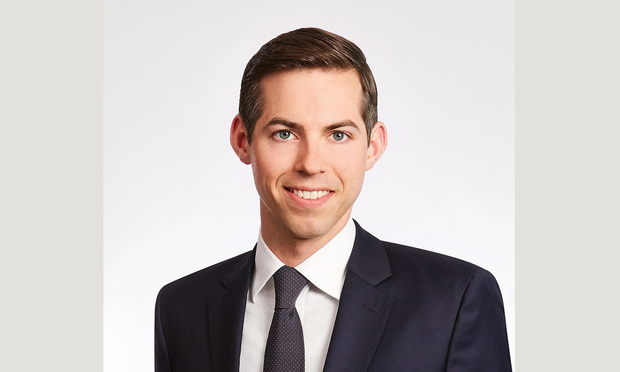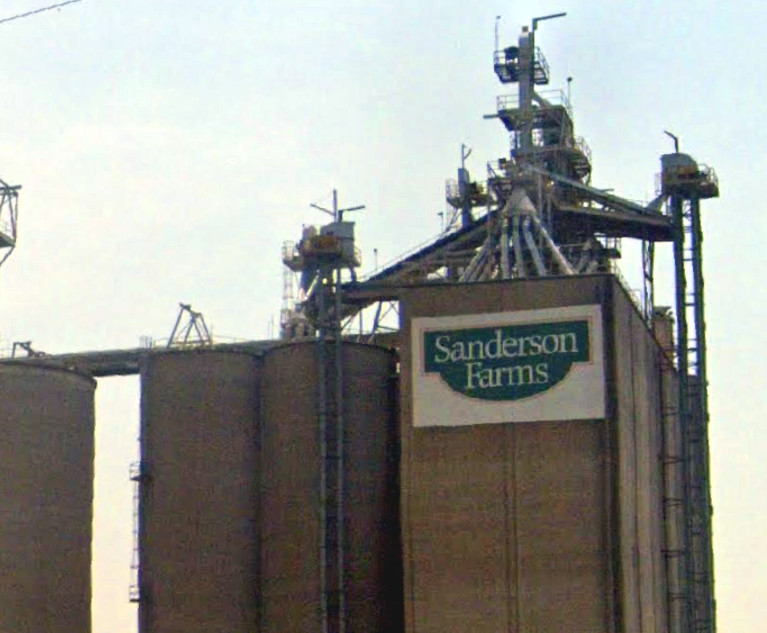Texas Hemp Under the TDA and DSHS
Texas is expected to have thousands of persons apply to grow hemp in 2020, sowing the seeds of a crop that could create growth in industries such as agriculture, food and beverage, textiles, and construction.
March 26, 2020 at 07:08 PM
6 minute read
 Cameron Field is co-leader of the cannabis practice at the law firm Michael Best.
Cameron Field is co-leader of the cannabis practice at the law firm Michael Best.
Texas is on the brink of producing hemp for the first time since the middle of the 20th century. On March 16, after about one year of regulatory and legislative tinkering, the Texas Department of Agriculture (TDA) released applications to the public to obtain a license to cultivate hemp. While TDA has not yet released the numbers of license applicants, Texas is expected to have thousands of persons apply to grow hemp in 2020, sowing the seeds of a crop that could create growth in industries such as agriculture, food and beverage, textiles, and construction. Because hemp has many uses, the current hemp regulatory program in Texas spans across both TDA as well as the Department of State Health Services (DSHS). Generally, TDA regulates the cultivation and processing of hemp, while DSHA regulates consumable hemp products such as cannabidiol (CBD).
Hemp Under TDA
Texas, unlike many states, did not implement a hemp pilot program pursuant to the 2014 Farm Bill, and therefore hemp cultivation in the state has remained illegal until 2020. In October 2019, the U.S. Department of Agriculture's (USDA) Interim Hemp Rule, which set standards for hemp production in the United States, allowed states to submit their own hemp production plans for USDA approval. Such approval allows the states, not USDA, to be the principal regulatory authority to oversee and implement their individual hemp production plans. Texas submitted its hemp plan to the USDA on Dec. 2, 2019, and it was approved Jan. 27, paving the path for Texas to adopt regulations and allow both the farming of hemp and production of hemp derived products.
The TDA rules that create the hemp production program were published in January 2020 and became effective March 11. The TDA hemp production program sets up a licensing system, and requires "any person who wishes to produce, handle or sample and collect hemp at any location in the state of Texas" to obtain a hemp license from TDA. The license requirement applies both to persons who wish to grow hemp and those who wish to only process hemp. Persons must apply for a license through the TDA website. While licenses are not limited in quantity, persons applying must meet certain basic qualifications, such as passing a state and federal background check. Any individual with a drug-related felony within the past 10 years is not eligible to receive a license or be a "key participant" (i.e., CEO) in the hemp business. Given this requirement, investors and businesses need to carefully consider who will serve in critical roles in a hemp business in Texas.
In addition to a producer's license, TDA is further requiring license holders to register the facility where the hemp will be grown (and pay a $100 per-facility fee) as well as a permit ($100 per permit) for each "lot" of hemp that will be grown. Every cultivar of hemp grown at a facility will require an additional lot permit, as will each non-contiguous field or greenhouse of hemp, such as fields separated by public roadways. TDA also requires each cultivar of hemp grown to be from a seed that is certified or otherwise approved by TDA. TDA keeps a list of approved varieties on its website and accepts applications to approve unlisted varieties.
The testing of hemp will be required for growers to ensure the hemp is below the federal and state limit of 0.3% tetrahydrocannabinol (THC) on a dry weight basis. Persons may only legally sell lots of hemp that are tested at a state-approved laboratory within 15 days of harvest and are below the 0.3% THC threshold. The transport of samples to the sampling laboratory, and of hemp beyond the Texas facility where it was produced, will require a TDA-issued transport manifest. TDA has yet to develop or identify the process for obtaining a transport manifest, but, given how regularly producers will need to transport hemp, be it to laboratories, processors, storage or retail, the process should be a simple one to not hamper the industry.
Hemp Under DSHS
In addition to TDA rules, the Texas Department of State Health Services is also required to draft rules pursuant to HB 1325, which legalized hemp in Texas. DSHS published a draft rule in 2019 and held a public hearing on those rules in December 2019, but has yet to finalize the rules. Now that TDA has finalized its hemp production regulations, DSHS will be working in tandem with TDA to finalize its rules that it drafted to implement H.B. 1325. DSHS's draft rule establishes a manufacturing licensure program for consumable hemp products and a registration process for retailers who sell consumable hemp products containing CBD. These regulations will be a critical piece of the hemp economy in Texas, as manufacturing operations are critical to drive demand for growers and influence whether growers plant strains of hemp that are preferable for CBD, food (seed) or fiber production.
The adoption of rules by DSHS is imminent given the draft rules have already been through the public comment process and TDA has published its licensing program rules. With Texas growers eager to get seed in the ground in 2020, and keen entrepreneurs looking to start hemp manufacturing businesses, staying up to date and informed on the state requirements will benefit persons and businesses looking to join the Texas hemp economy. TDA and DSHS both have a hemp-specific web pages informative FAQs. For both Texas-specific and general cannabis industry news, the cannabis team at my firm, Michael Best, regularly publishes articles on our website about key developments in the cannabis industry.
Cameron Field is co-leader of the cannabis practice at the law firm Michael Best & Friedrich. Field is a nationally recognized leader on cannabis regulations and works with businesses to navigate the ever changing regulatory landscape, launch cannabis products, and mitigate risk. He is based out of Austin.
This content has been archived. It is available through our partners, LexisNexis® and Bloomberg Law.
To view this content, please continue to their sites.
Not a Lexis Subscriber?
Subscribe Now
Not a Bloomberg Law Subscriber?
Subscribe Now
NOT FOR REPRINT
© 2025 ALM Global, LLC, All Rights Reserved. Request academic re-use from www.copyright.com. All other uses, submit a request to [email protected]. For more information visit Asset & Logo Licensing.
You Might Like
View All
'Close Our Borders?' Senate Judiciary Committee Examines Economics, Legal Predicate for Mass Deportation Proposal
3 minute read


Another Roundup Trial Kicks Off in Missouri. Monsanto Faces 3 Plaintiffs
4 minute readLaw Firms Mentioned
Trending Stories
- 1'It's Not Going to Be Pretty': PayPal, Capital One Face Novel Class Actions Over 'Poaching' Commissions Owed Influencers
- 211th Circuit Rejects Trump's Emergency Request as DOJ Prepares to Release Special Counsel's Final Report
- 3Supreme Court Takes Up Challenge to ACA Task Force
- 4'Tragedy of Unspeakable Proportions:' Could Edison, DWP, Face Lawsuits Over LA Wildfires?
- 5Meta Pulls Plug on DEI Programs
Who Got The Work
Michael G. Bongiorno, Andrew Scott Dulberg and Elizabeth E. Driscoll from Wilmer Cutler Pickering Hale and Dorr have stepped in to represent Symbotic Inc., an A.I.-enabled technology platform that focuses on increasing supply chain efficiency, and other defendants in a pending shareholder derivative lawsuit. The case, filed Oct. 2 in Massachusetts District Court by the Brown Law Firm on behalf of Stephen Austen, accuses certain officers and directors of misleading investors in regard to Symbotic's potential for margin growth by failing to disclose that the company was not equipped to timely deploy its systems or manage expenses through project delays. The case, assigned to U.S. District Judge Nathaniel M. Gorton, is 1:24-cv-12522, Austen v. Cohen et al.
Who Got The Work
Edmund Polubinski and Marie Killmond of Davis Polk & Wardwell have entered appearances for data platform software development company MongoDB and other defendants in a pending shareholder derivative lawsuit. The action, filed Oct. 7 in New York Southern District Court by the Brown Law Firm, accuses the company's directors and/or officers of falsely expressing confidence in the company’s restructuring of its sales incentive plan and downplaying the severity of decreases in its upfront commitments. The case is 1:24-cv-07594, Roy v. Ittycheria et al.
Who Got The Work
Amy O. Bruchs and Kurt F. Ellison of Michael Best & Friedrich have entered appearances for Epic Systems Corp. in a pending employment discrimination lawsuit. The suit was filed Sept. 7 in Wisconsin Western District Court by Levine Eisberner LLC and Siri & Glimstad on behalf of a project manager who claims that he was wrongfully terminated after applying for a religious exemption to the defendant's COVID-19 vaccine mandate. The case, assigned to U.S. Magistrate Judge Anita Marie Boor, is 3:24-cv-00630, Secker, Nathan v. Epic Systems Corporation.
Who Got The Work
David X. Sullivan, Thomas J. Finn and Gregory A. Hall from McCarter & English have entered appearances for Sunrun Installation Services in a pending civil rights lawsuit. The complaint was filed Sept. 4 in Connecticut District Court by attorney Robert M. Berke on behalf of former employee George Edward Steins, who was arrested and charged with employing an unregistered home improvement salesperson. The complaint alleges that had Sunrun informed the Connecticut Department of Consumer Protection that the plaintiff's employment had ended in 2017 and that he no longer held Sunrun's home improvement contractor license, he would not have been hit with charges, which were dismissed in May 2024. The case, assigned to U.S. District Judge Jeffrey A. Meyer, is 3:24-cv-01423, Steins v. Sunrun, Inc. et al.
Who Got The Work
Greenberg Traurig shareholder Joshua L. Raskin has entered an appearance for boohoo.com UK Ltd. in a pending patent infringement lawsuit. The suit, filed Sept. 3 in Texas Eastern District Court by Rozier Hardt McDonough on behalf of Alto Dynamics, asserts five patents related to an online shopping platform. The case, assigned to U.S. District Judge Rodney Gilstrap, is 2:24-cv-00719, Alto Dynamics, LLC v. boohoo.com UK Limited.
Featured Firms
Law Offices of Gary Martin Hays & Associates, P.C.
(470) 294-1674
Law Offices of Mark E. Salomone
(857) 444-6468
Smith & Hassler
(713) 739-1250






